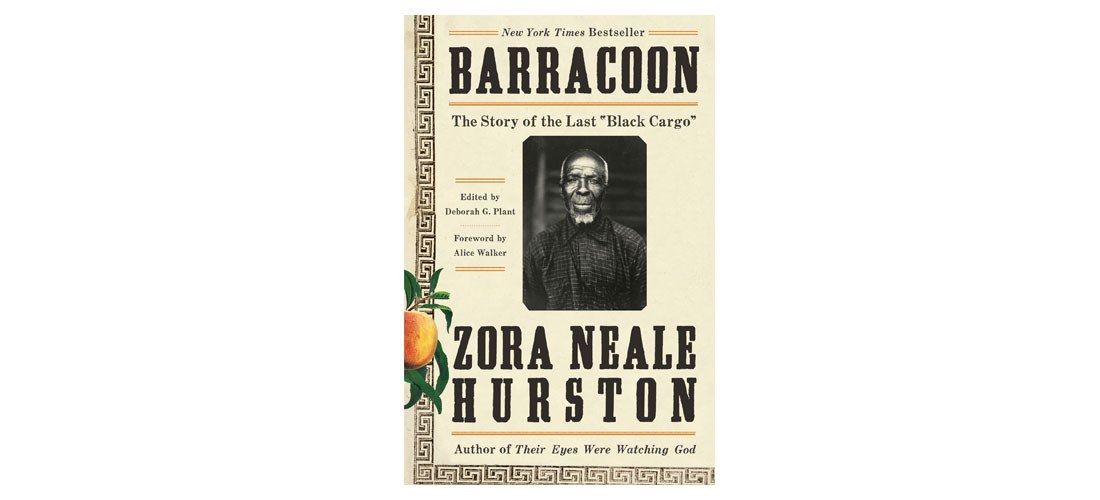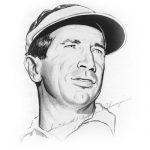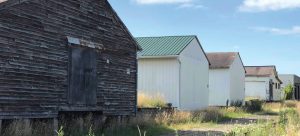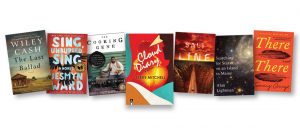
Dark Passage
An oral history recounts the grim realities of slavery
By Stephen E. Smith
Barracoon: The Story of the Last “Black Cargo” is an oral history as told by Cudjo Lewis, a 95-year-old former slave who was among the last Africans transported to the United States prior to the Civil War. (A barracoon is an enclosure, fortress or compound in which black captives were held before being sold to slavers.)
Lewis’ narrative is pieced together from interviews conducted in 1927 by Zora Neale Hurston, an anthropologist and popular writer of the Harlem Renaissance who had, prior to the publication of Barracoon, faded into obscurity. After completing her three months of interviews with Lewis, Hurston was unable to find a publisher for her manuscript and Lewis’ story languished for 90 years until it was released by Amistad, a HarperCollins imprint, and immediately climbed The New York Times best-seller list.
Slave narratives aren’t a rarity. The Life, History, and Unparalleled Sufferings of John Jea, The African Preacher, The Life of Olaudah Equiano, Narrative of the Life of Frederick Douglass, Incident in the Life of a Slave Girl, etc., have enjoyed popular acceptance, so much so that they assume a similar narrative pattern, beginning with a statement of birth, usually taking place on a plantation, and concluding with reflections upon the slave experience from the point of view of a freeman. Barracoon differs from the typical slave narrative: It’s the complete recounting of the slave experience, beginning with the principal’s early life in Africa, the massacre of his family, his time in a barracoon, the Middle Passage, during which he was packed with more than 100 other human beings aboard the ship Clotilde, and his suffering as a freed slave who found himself without family in a strange, hostile land where his existence was marked by brutality and endemic bigotry. Nothing about Lewis’ story is uplifting. Degradations, heaped one upon another, marked his passage through a life that was a desperate struggle for survival marked by physical and emotional suffering.
So why publish such a book? Isn’t there grief enough in the world? And why read about suffering that’s past and done?
The casual student of history understands that slavery was the dominant disruptive force in our nation’s history, and that issues of caste and class continue to profoundly disturb the workings of our democracy. If slavery is the legal expression of the relative status of one race to another, it’s possible to prohibit by law the mechanisms that enable the attendant injustices. It’s much more difficult to banish the persistent stigma of slavery from the hearts and minds of our citizens. Hurston had a responsibility to relate the undeniable horrors of Lewis’ life so that readers could truly comprehend the circumstances under which he lived. Writers and/or folklorists take no pleasure in making readers miserable, but sentimentality is deadly stuff, and it’s reprehensible to hide the grim realities of life with self-serving lies. Just as we must confront the horrors of the Holocaust, it’s well that we have access to the unvarnished truth about slavery. We need to face the past as it was in order to comprehend the pernicious legacy that shapes the present. Cudjo Lewis no doubt understood this when he said, “Thankee Jesus! Somebody come ast about Cudjo.”
To comprehend Lewis’ experience, it’s necessary to understand his dialect; therefore, Hurston’s facility at producing a text that conveys the orality of her informant’s spoken words is of the utmost importance. Initially Lewis’ dialect can be slow going for readers who have difficulty comprehending the peculiarities of his vernacular, which is unlike the more contrived dialect of Mark Twain’s Jim or Joel Chandler Harris’ Uncle Remus. “Yeah, in Afficky we always know dere was a God; he name Alahua, but po’ Affickans we cain readee de Bible, so we doan know God got a Son. We ain’ ignant — we jest doan know. Nobody doan tell us ’bout Adam eatee de apple, we didn’t know de seven seals was sealee ’gainst us.” After reading a few pages of dialect, the reader slips easily into the rhythm of the language and Lewis is easily understood.
Hurston worked hard at producing a readable but authentic facsimile of Lewis’ speech, but it was this use of dialect that publishers, intent on translating the text into Standard English, offered as a justification for rejecting publication of the manuscript.
The subplot of Barracoon concerns Hurston’s determination to gently coax from Lewis his life experience. A few critics have dismissed the book as Hurston’s recreation of Lewis’ story, but it’s clear to the reader — indeed it is necessary for the reader to believe — that Hurston resisted interjecting her own point of view into Lewis’ telling. She’s patient with Lewis and sensitive to his emotional reaction to the terrors of his life, enticing him with peaches and gently prodding him into revealing the most intimate and horrifying details.
The attack on Lewis’ African village, the death of his loved ones, the Middle Passage, and his years as a slave are all necessary elements of the story, but Lewis’ primary focus is on his life in Africatown, the community in which he lived after emancipation. He lost children in unexplained accidents, was swindled by white lawyers, and eventually suffered the death of his wife. And like all African-Americans of the time, he endured the humiliations of Jim Crow. What resonates with the reader is Lewis’ homesickness, his love and longing for his African childhood, and his humanity. When Hurston asked him to pose for a photograph, Lewis donned his best suit of clothes — but stood before the camera in bare feet. “I want to look lak I in Affica, ’cause dat where I want to be,” he said. After living most of his life in America, he still pined for his homeland.
At a time when compassion is in short supply, Cudjo Lewis’ story is a reminder that all that’s good and human in our hearts needs renewing. OH
Stephen E. Smith is a retired professor and the author of seven books of poetry and prose. He’s the recipient of the Poetry Northwest Young Poet’s Prize, the Zoe Kincaid Brockman Prize for poetry and four North Carolina Press awards.





